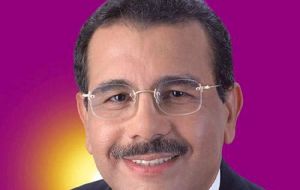MercoPress. South Atlantic News Agency
Dominican president doctors succession: his top aide and the First Lady
 Danilo Medina is the next president but the strongman sin outgoing Leonel Fernandez
Danilo Medina is the next president but the strongman sin outgoing Leonel Fernandez The election of Danilo Medina as president of the Dominican Republic signals a continuation of the policies that many experts say have helped the country grow during the past eight years.
Medina's vice president will be Margarita Cedeño de Fernandez, Leonel Fernandez's wife and outgoing first lady.
With 100% of the ballots counted, Medina had more votes than his closest challenger, Hipolito Mejia, who declined to immediately concede.
But Medina is moving forward and, in an interview with CNN said his top priority was to make sure opportunities are made available to all Dominicans. He said he would work to create opportunity for young people.
“I want to build a middle-class society. That is my main goal -- to have a population that is able to go shopping, to have the capacity to consume,” he said.
Medina said he wants to “create a society of inclusion that promotes opportunities for all.”
“This is a country that has created a lot of wealth in recent years. My job is to make sure that wealth trickles down,” he said.
It is an ambitious goal for a country that has seen some growth, but a number of ingrained obstacles.
“The Dominican Republic is one the country's that before the economic downfall had high rates of growth,” said Johanna Mendelson Forman, a senior associate for the Americas Program at the Center for Strategic and International Studies.
But challenges include high costs of energy on the island, and the difficulties of sharing an island with the more fragile Haiti, she said. Health issues in Haiti, like a cholera outbreak, can easily cross the border in the Dominican Republic.
Overall, the country had a good eight years under Fernandez, and one can expect to see the investments he made continue under Medina, Mendelson Forman said.
Medina has been by Fernandez's side for quite a while, and “he knows where all the ghosts are buried,” which can be a good thing, she said.
Medina is the first of eight children, and has a long history in politics in the Dominican Republic.
He was elected to Congress in 1986, 1990 and 1994. During that final term, he was elected president of the Dominican House.
He served as the spokesman for his political party and was a member of the Latin American Parliament.
Medina was secretary of state twice, both under the leadership of Fernandez.
As president, Medina said he would focus on education, too.
On the campaign trail, he promised to spend 4% of GDP on education, and said he intends to see that through. A key to lifting people out of poverty, and the country as a whole, he said, is to have an educated workforce.
Although he said his country will continue to have a close relationship to Hugo Chavez, whose country provides oil, he sees Brazil's recent success as the path to emulate.
People are “expecting significant changes,” he said. He also addressed the issue of drug legalization, saying it does not matter whether Latin America legalizes or not.
For legalization to have any impact, the conversation has to happen in the United States, where the demand is, not in Latin America where the supply is, he said.
“The problem of narco-trafficking is the market: if you limit the market, the drug trafficking falls”.




Top Comments
Disclaimer & comment rulesCommenting for this story is now closed.
If you have a Facebook account, become a fan and comment on our Facebook Page!